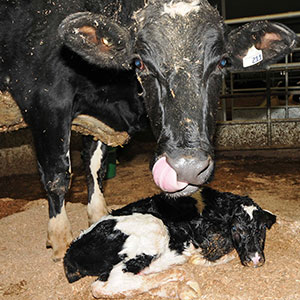 We’re headed to a future where more often than not, somebody is always watching what you’re doing.
We’re headed to a future where more often than not, somebody is always watching what you’re doing.
This can have significant consequences not just for your own farm, but also for the entire livestock industry, especially given the growing trend toward undercover activist videos.
Dr. Jennifer Walker, an expert in bovine health and on-farm management practices, will talk about animal welfare and livestock production at the upcoming Health Calf Conference.
She’s the Director of Dairy Stewardship with Dean Foods, a dairy company in the United States, where she is responsible for helping create industry-leading best practices in animal welfare, milk quality and farm resource management.
Three years ago, Dean Foods created the Animal Welfare Advisory Council, which consists of a team of farmers, customers and animal welfare experts, to develop a national program that both showcases what farmers are doing to provide topnotch animal care, as well as identifying areas that may need improvement.
Healthy Calf Conference information
The Healthy Calf Conference runs December 2 from 9 am to 3 pm at the Arden Park Hotel in Stratford, with remote locations in Northern Ontario to be determined, and December 4 from 9 am to 3 pm at the Maxville and District Sports Complex in Maxwell.
Registration fees before the event and at the door are $90/person and $30/person for students. click here to register.
Is your barn camera ready?
In this age of social media, undercover activists and citizen journalism, farmers are increasingly under scrutiny about how they raise their animals and grow their crops.
Here are some tips on how you can help fight the activist threat:
- Make sure you are aware of and follow Best Management Practices and the Codes of Practice.
- Train all farm workers in proper animal care and handling.
- Establish an animal care code of conduct for your farm and make sure all your workers – family and non-family – are aware of what it includes. Ask them to sign it to show they understand what is expected of them when it comes to responsible animal care.
- Make sure anyone working on your farm knows what to do and who to go to if they see something that doesn’t look quite right.
- Know who you are hiring. Check references, think twice about hiring if the person’s identification is questionable, such having only a university ID, and ask questions about things that may seem unusual, such as driving a vehicle from out of province.
- Keep your farm neat and clean. Tidy, safe environments are good for both livestock and people who work with them.
- Consider looking at your operation through the eyes of someone who knows nothing about farming and whose only exposure to animals is their pet.
 We’re headed to a future where more often than not, somebody is always watching what you’re doing.
We’re headed to a future where more often than not, somebody is always watching what you’re doing.